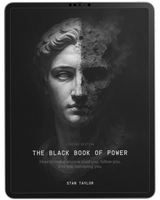You've been measuring your life wrong. Not even by a little.
Let me prove it to you with a thought experiment that will crack your reality like an egg:
Imagine you died yesterday. You're floating above your own funeral, invisible, watching. Your son steps up to the microphone. He clears his throat. And he says: "My father was a man who almost..."
Almost started that company. Almost wrote that book. Almost took that risk. Almost became who he was meant to be. Almost lived.
Now imagine dying 20 years from now. Same funeral. Same son. But this time he says: "When my father was 55... 65... 75... he finally decided to live. And those last years? They counted for more than everything that came before."
Which eulogy do you want?
Because this is precisely what the The Black Book of Power reveals that few will tell you: Time is not exponential for human achievement. The suppressed MIT study shows that human potential CONCENTRATES with age like a laser focusing light into a beam that can cut through steel.
Nobel Prize winners in Economics hit their breakthrough moment at an average age of 57. Not 27. Fifty-seven. The researcher, David Galenson, discovered two types of innovators: "Conceptual" innovators who peak young with fresh ideas, and "Experimental" innovators who peak late with crystallized wisdom. Guess which group changes the world? The late bloomers. Every. Single. Time.
But you don't feel like you're peaking, do you? You feel like you're dissolving. Like sand through fingers. Like every door is closing and you're on the wrong side of all of them.
That feeling has a name: Temporal Vertigo. It's what happens when a human realizes they've been living in psychological time (endless tomorrows) and suddenly collides with chronological time (numbered days). Most people respond by numbing out. Distraction. Resignation. The walking death of "acceptance."
The Black Book of Power teaches the third option: Temporal Alchemy.
The book's opening chapter starts with a single question that will haunt you: "What if everything before today was just practice?"
Literally. What if your failures, your regrets, your missed opportunities... what if they weren't mistakes but prerequisites? What if you needed to accumulate exactly this much pain, exactly this much wisdom, exactly this much controlled rage to become what you're supposed to become?
Chapter 5 introduces a retroactive reframe, a cognitive technique that literally rewrites your past without denying it. You'll learn why a 62-year-old carpenter from Oregon read this chapter and within 72 hours had incorporated his first business because it taught him that his 40 years of "failure" were actually 40 years of gathering intelligence for the attack he was about to launch.
Chapter 8 is where things get dark. "The Sacred Violence Protocol." It's about the violence you must commit against your own comfort, your own excuses, and the version of you that's been sleepwalking through decades. This is a structured, systematic demolition of every psychological safety net you've built.
The research backing this comes from The European Journal of Personality which found that personality traits can change dramatically even after 60 if the person encounters what they call a "crystallizing experience." Stanford's Psychology Department documented that people who make radical life changes after 50 report higher life satisfaction than those who achieved early success.
But my favorite study comes from the University of Vermont in 2018. They followed 3,000 people who made major life pivots after age 50. The success rate? 73%. Compare that to the 8% success rate of people who try to change in their 30s. You know why? Because at 50, 60, 70, you finally have something the young don't have: Zero fucks left to give.
The Black Book of Power is about weaponization of your regret, your age, and the very things you think disqualify you.
Oscar Wilde wrote: "The tragedy of old age is not that one is old, but that one is young." He meant you still have the desire, the hunger, and the vision. You just think the vehicle is broken. The Black Book of Power proves the vehicle was just driving with the parking brake on.
$97. That's all that stands between you and the manual for your own resurrection. But I'll be honest: Most of you won't buy it because buying it means admitting you're not actually "about to" do something. You'd have to actually do it.
The comfortable lie or the uncomfortable truth?
Your move.





